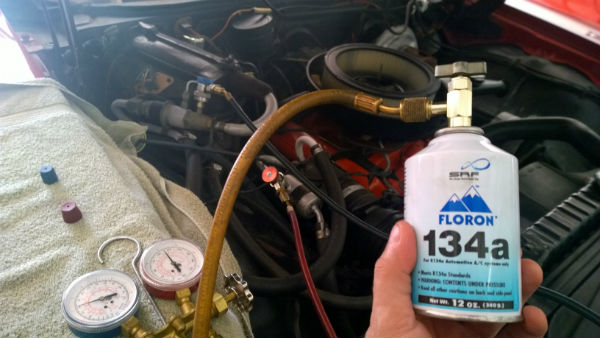
If the air conditioning system in your car is not running properly for one reason or another, you are probably looking into fixing it or getting it replaced. However, if your vehicle was made before 1995, like many muscle cars, it most likely contains R12 and you might consider converting to 134a. The debate between R12 and 134a is a complicated one, so we've answered five main questions you might have when approaching this problem.
What’s the difference between R12 and 134a? R12 and 134a are refrigerants used in car air conditioning systems. R12 was used in most cars and trucks until 1995 when it was replaced with 134a. Other than new car manufacturers over the last few years having switched to 1234yf, it's remained in use ever since. The main difference between the two is that R12 is the amount of time they remain in earth's atmosphere, with the newer 134a significantly less than the old R12.
Why was the manufacturing of R12 banned? R12 contains CFCs like hairspray once did, that is potentially damaging to the ozone layer. It was banned because of this potential environmental risk and replaced by 134a because 134a, using synthetic oil over mineral oil, does not have as much of a negative environmental impact that R12 does.
Why should I make the switch from R12 to 134a? The manufacturing ban on R12 makes it difficult to find at most auto stores now. If you can find R12, it has either been stored or it's been imported. Either way, it'll be fairly expensive, especially when compared with 134a.
How do I convert an R12 air conditioning system to a 134a system? There are conversion kits that can help as well as conversion calculators online to aid in the conversion, but the process easy to follow with simple instructions here.
I've found R12 is effective in my car. Should I still convert to 134a, or should I keep the old R12? If converted properly, most cars can get the same vent temperatures as the car originally did with the old R12. There are few exceptions, but generally, cars with undersized evaporators (Corvettes, for one) occasionally struggle in 90' plus heat. If you truly are adamant about R12, it's recommended that you go through the entire system to ensure it's leak-free for years of trouble-free performance. Most of the same procedures in converting to 134a will still apply when getting an R12 system back up and running.
All in all, 134a is preferable to R12 because it is readily available, affordable and self-manageable on top of being better for the environment. Hopefully, these answers will help you understand the differences between R12 and 134a and guide you in fixing your car air conditioning system.
